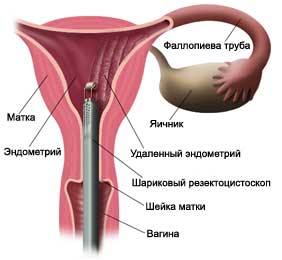Endometrial ablation
Description endometrial ablation
This procedure involves the surgical removal of the uterus cover. Removal can be carried out using heat, cold, Microwave radiation or other techniques.
Causes of endometrial ablation
Endometrial ablation is performed with a serious disruption of menstruation. In some cases, she stops menstruating completely. This procedure is used to treat menorrhagia (excessive blood loss during menstruation).
Talk to your doctor about your plans for having a baby. This procedure greatly reduces the chances of getting pregnant.
Possible complications of endometrial ablation
Complications are rare, but no procedure does not guarantee the absence of risk. If you plan to endometrial ablation, you need to know about possible complications, which may include:
- Infection;
- Bleeding;
- Complications, associated with anesthesia;
- Uterine perforation or organ injury;
- Edema (naʙuxanie) due to leakage and accumulation of fluid;
- Thermal (Thermal) vaginal trauma, vulva, or intestine.
Some factors, that may increase the risk of complications:
- Pregnancy or possible pregnancy – the operation should not be done, if there is a probability of pregnancy;
- History of pelvic inflammatory disease, which may cause relapse;
- Inflammation of the cervix;
- Being overweight or obese;
- Smoking.
How is endometrial ablation?
Preparation for the procedure
Before the procedure, the doctor may prescribe or perform the following:
- Endometrial biopsy, US, or hysteroscopy uterus to verify the violations and determine the shape and size of the uterus;
- Ask questions:
- In history;
- By taking medication and nutritional supplements;
- In the presence of allergy;
- In pregnancy or trying to get pregnant;
- The doctor will ask, Do you have any intrauterine device (Navy).
Before the procedure:
- Ask your doctor about possible options for endometrial ablation;
- Consult your doctor about the drugs taken. A week before surgery you may be asked to stop taking some medicines:
- Anti-inflammatory drugs (eg, aspirin);
- Blood thinners, such as clopidogrel or warfarin;
- Take medicine, to soften the lining of the womb;
- It is necessary to organize the return home from the hospital. You may also need help at home;
- Try to quit smoking.
The day before the procedure,:
- You can eat a light dinner;
- Do not eat or drink anything on the day of surgery.
Anesthesia
They can be used the following types of anesthesia:
- General anesthesia – blocks any pain and the patient support in a sleep state during operation. Administered intravenously in the arm or hand.
- Regional anesthesia – blocks pain in a particular area of the body, the patient is awake. Administered by injection.
- Local anesthesia – anaesthetises body, during surgery, the patient is awake. It can be provided in the form of injections.
The doctor will determine, which one is right for you.
Procedure endometrial ablation
There are many different ways to carry out this procedure,. Simple removal takes a little time. It can often be done in outpatient clinics. Other procedures take longer and need to be carried out in the hospital.
During the procedure, the doctor will not make any incisions to access the uterus. A small probe is inserted through the vagina and cervix in its cavity. Depending on the method of operation of the probe tip may have the following nozzle:
- Radiofrequency (uses heat and energy);
- Kriodestruktsionnaya (Low temperatures);
- Hot liquid;
- Hot air balloon;
- Microwave;
- Electrosurgical (electric current, Balloon and heated or spikes). The procedure may require general anesthesia.
With these methods it is possible to destroy the cells, lining the uterus. You will not feel pain. Often used ultrasound to help the physician during surgery. To remove tissue, which was destroyed, It will use a suction device.

How long will endometrial ablation?
It depends on the method used. The procedure may take 15-45 minutes or longer.
Endometrial ablation – Will it hurt?
You may feel cramping and discomfort. To reduce the pain doctor gives painkillers.
The average hospital stay
Endometrial ablation is usually performed on an outpatient basis. Maybe, after the procedure will have to stay in hospital for 1-2 hours. Some methods may require ablation to stay overnight in the hospital.
Care after endometrial ablation
Care in a hospital
During recovery, you may receive the following help:
- Checking blood pressure, heart rate and breathing;
- It analyzes the level of fluid and electrolytes in the blood.
When the doctor to make sure, that you feel well enough, He was allowed to return home.
Home Care
After the procedure:
- You may feel cramping during 1-2 days;
- There may be copious for 2-3 days;
- There may be watery, bloody discharge for several weeks;
- During the first days after the treatment bath should be taken several times a day.
When you return home, Follow these steps:, to ensure the normal recovery:
- Check, that you have at home there is a stock of sanitary napkins;
- You can return to normal activities within a day or two after surgery. Ask your doctor, when you can:
- Do sport;
- Resume sexual activity;
- Start using tampons;
- Take a shower, bathe;
- Further:
- We need to use contraceptives to prevent pregnancy;
- Go Pap test;
- Complete pelvic examination.
Contact your doctor after endometrial ablation
After returning home, you need to see a doctor, If the following symptoms:
- Heavy vaginal bleeding;
- Severe abdominal cramping and pelvic pain;
- Severe pain during sex;
- Severe back pain;
- Pain during bowel movements or urination;
- Signs of infection, including fever and chills;
- Nausea and vomiting;
- Cough, chest pain or shortness of breath;
- Dizziness;
- Pain or tenderness in the calf muscles or leg;
- The absence of menstruation after 2-3 periods.
